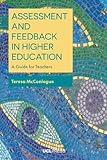Assessment and feedback in higher education : [electronic resource] a guide for teachers / Teresa McConlogue.
Material type: TextPublication details: London : UCL Press, 2020.Description: 1 online resource : illustrationsISBN:
TextPublication details: London : UCL Press, 2020.Description: 1 online resource : illustrationsISBN: - 978-1-78735-364-0
| Item type | Current library | Call number | Status | Date due | Barcode | |
|---|---|---|---|---|---|---|
| E-Resources | Main Library E-Resources | 378 M478 (Browse shelf(Opens below)) | Available | E004279 |
Intro -- Title Page -- Copyright Page -- Contents -- List of Figures and Tables -- Glossary -- Acknowledgements -- 1. Introduction -- 2. Key Perspectives -- Part 1: Designing Assessment -- 3. Designing Assessment for a Course Unit/Module -- 4. Designing Assessment Across a Programme -- 5. Reaching Out: Making Links with Communities -- Part 2: Making Judgements -- 6. Marker Reliability -- 7. Peer and Collaborative Assessment -- 8. Giving Good Quality Feedback -- Part 3: Inclusivity -- 9. Developing Inclusive Curriculum and Assessment Practices -- 10. Conclusion -- References -- Index
Teachers spend much of their time on assessment, yet many higher education educators have received minimal guidance on assessment design and marking. This means assessment can often be a source of stress and frustration. Assessment and Feedback in Higher Education aims to solve these problems. Offering a concise overview of assessment theory and practice, this guide provides teachers with the help they need. In education, theory and practice are often poorly linked. In this guide, Teresa McConlogue presents theoretical ideas and research findings and links them to practice. She considers recent theoretical work on feedback and suggests ways of developing evaluative judgement. Throughout the book, teachers are encouraged to examine their practice critically, and there are ideas for small-scale educational investigations, involving teachers, their colleagues and students, such as using the Assessment Review Questionnaire to adapt assessments. A key principle of Assessment and Feedback in Higher Education is that an understanding of academic standards is fundamental to good assessment design and more reliable marking. The guide explores the concept of academic standards and proposes methods of co-constructing shared standards within a teaching team and with students through calibration activities.
There are no comments on this title.

